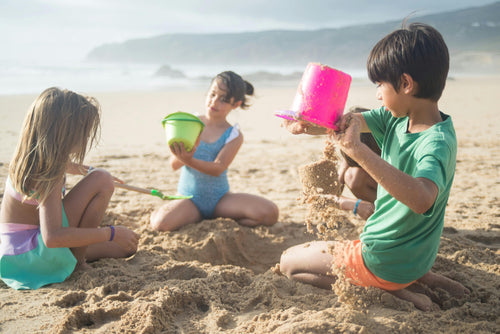
The Benefits of Outdoor Play for Children's Physical and Emotional Development
Outdoor play is essential for a child's physical, emotional, and psychological development. These activities not only provide children with a way to expend energy, but they also play a crucial role in their overall development. By engaging children in outdoor play, we offer them a unique opportunity to explore the world, interact socially, and strengthen their health in a fun and natural way. This article takes a detailed look at how outdoor play helps shape healthier, happier, and more balanced individuals.
Physical development through outdoor play
Outdoor activities provide an ideal platform for children's physical development. They encourage healthy growth through a variety of movements that stimulate both gross and fine motor skills.
Strengthening gross motor skills: Running, jumping, climbing, or riding a bike helps children develop strength, endurance, and coordination. These activities help build strong muscles and improve balance, which is essential for overall physical development.
Fine motor skill development: Activities like drawing with sidewalk chalk, manipulating small garden tools, or assembling natural elements to create works of art strengthen dexterity and hand-eye coordination. These skills are crucial for other areas of learning, such as writing and manipulating precise objects.
General health: Outdoor play also exposes children to sunlight, which is an important source of vitamin D. This vitamin plays a key role in strengthening bones and the immune system. Additionally, regular physical activity helps prevent many lifestyle-related diseases, such as obesity and heart disease.
In short, outdoor play is fundamental in helping children develop good physical health and acquire motor skills essential for their growth.
Sensory stimulation and learning
The outdoor environment is a natural playground that stimulates all the senses, offering children a rich palette of experiences that promote learning and cognitive development.
Sensory Exploration: Outdoor activities allow children to explore and interact with different natural stimuli. Touching sand, walking barefoot on grass, listening to birds sing, or smelling flowers and wet earth are experiences that stimulate children's natural curiosity and encourage their sensory exploration.
Hands-on learning: The outdoor world offers endless opportunities for hands-on learning. Observing insects, collecting leaves of different shapes and colors to compare, or tracking the cycles of the seasons by observing trees transforms children into little scientists, allowing them to concretely understand the abstract concepts taught in the classroom.
Cognitive development: These interactions with nature help develop problem-solving, critical thinking, and creativity skills. The outdoor environment challenges children to think innovatively and adaptively, whether navigating an obstacle course or playing games that require rules to follow and adapt.
Outdoor play is therefore not only beneficial for children's physical health, but it is also essential to enrich their learning experience and stimulate their cognitive development in a comprehensive way.
Psychological and emotional development
The benefits of outdoor play on children's psychological and emotional development are profound and long-lasting.
Self-esteem and self-confidence: Overcoming physical challenges and succeeding in outdoor activities builds children's self-confidence and self-esteem. Every tree climbed or new bike path conquered can represent a significant victory for a child, teaching them perseverance and showing them they can overcome obstacles.
Emotional Management: Playing outdoors also allows children to better manage their emotions. The physical challenges and social interactions that naturally occur during outdoor play provide opportunities for children to learn how to manage frustration, excitement, and other complex emotions.
Autonomy and resilience: Outdoor play encourages autonomy and independent decision-making. When children play away from direct adult supervision, they learn to make decisions for themselves and solve problems, which helps develop their resilience and ability to adapt to new situations.
These aspects of development are essential in helping children become well-rounded adults who are able to face life's challenges with confidence and competence.
Outdoor play is essential for a child's all-round development, impacting physical, cognitive, social, and emotional development. By regularly encouraging children to explore and play outdoors, parents and caregivers can play a crucial role in their growth and well-being. It's important to recognize and value these activities not only for their immediate enjoyment but also for the many long-term benefits they bring to children's development.






